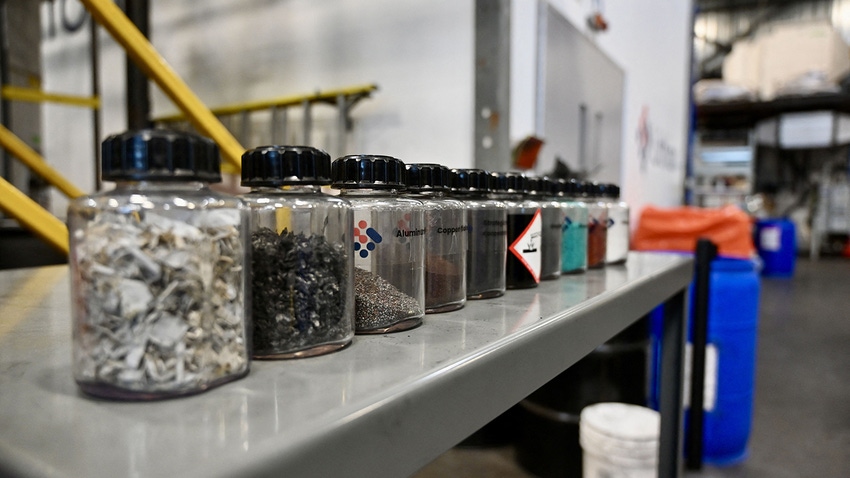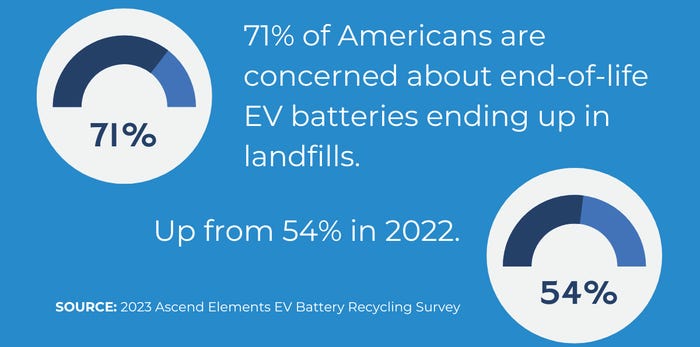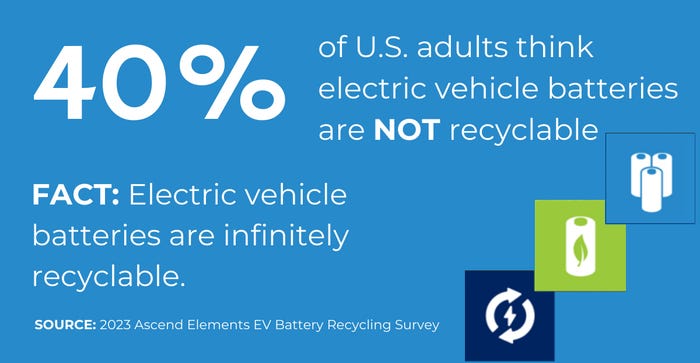Survey Reveals Rising US Concerns on EV Battery Disposal Amid Recycling Growth
Americans are increasingly concerned about the final fate of end-of-life EV batteries—even as a nascent EV battery recycling industry booms.

As the US electric vehicle (EV) market continues its growth trajectory, concerns among Americans are intensify regarding the fate of lithium-ion EV batteries at their end of life—despite the flourishing EV battery recycling sector.
A commissioned study by Ascend Elements unveils a marked surge, with 71% of US adults expressing apprehension about used EV battery disposal, a notable increase from 54% in 2022. This uptick is coupled with a rising perception—56% of respondents—that EV batteries will contribute to “toxic landfills,” up from 48% in 2022, potentially stemming from a fundamental misunderstanding of their recyclability. Nearly 40% believe lithium-ion EV batteries are not recyclable, down from 47% in 2022. The annual study, conducted by an independent research firm, sampled 1,004 US consumers, emphasizing a margin of error at +/-3% with a 95% confidence level.
“When I see this data, I can’t help thinking we’re not doing enough to educate the public about lithium-ion battery recycling,” stated Eric Gratz, co-founder and CTO of Ascend Elements. “Lithium-ion batteries, including EV batteries, are recyclable. The metals inside an EV battery are incredibly valuable and infinitely recyclable. I would expect electric vehicle batteries to end up in landfills about as often as gold bars.”

Credit: Ascend Elements
Ascend Elements, at the forefront of efficient lithium-ion battery recycling, employs its patented Hydro-to-Cathode process to recover up to 98% of critical metals. The resulting sustainable EV battery materials, known as cathode precursor (pCAM) and cathode active material (CAM), showcase performance on par with virgin materials, reducing carbon emissions linked to mining. With the capacity to recycle 30,000 metric tons of EV batteries per year—approximately 20% of North America's current lithium-ion battery recycling capacity—the company spearheads industry advancement.
Myths persist
Despite strides in efficiency and economics, Roger Lin, VP of Government Affairs at Ascend Elements, acknowledges persistent myths about EV battery recycling.
“The industry has made terrific advances in the efficiency and economics of lithium-ion battery recycling, but these false narratives about EV batteries continue,” Lin stated. “We are changing that by creating an infrastructure that would make it unthinkable to let a lithium-ion battery go to landfill. They are just too valuable.”
Amidst escalating concerns regarding EV batteries, the survey indicates a positive trend in Americans' understanding of recycling practices for various lithium-ion batteries.
Merely 21% of respondents believe lithium-ion batteries can be recycled in the household recycling bin, down from 33% in 2022.
Only 15% think lithium-ion batteries can be disposed of in the household trash, down from 27% in 2022.
“For the record, lithium-ion batteries should never be put in the trash or the household recycling bin,” emphasized Gratz. “While I’d like to see universal awareness of these basic recycling facts, the survey data suggests we’ve made some progress since last year.”

Credit: Ascend Elements
Improper disposal of lithium-ion batteries poses risks, including fires and explosions in waste facilities. Gratz advises that used lithium-ion batteries should be deposited at authorized collection points, highlighting the importance of checking with municipal recycling programs or visiting Call2Recycle for drop-off locations.
Ongoing education needed
The survey also identifies key opportunities for ongoing education about household lithium-ion battery use and recycling.
Only 40% grasp that they should not “charge an e-bike or electric scooter battery unattended or overnight.”
Over 60% correctly understand that one should “never leave a lithium-ion battery plugged in when not charging.”
42% recognize the importance of “always covering battery terminals with electrical tape or placing it in a clear plastic bag” before recycling.
30% are aware they should not “recycle damaged or recalled lithium-ion batteries in the same way as other lithium-ion batteries.”
The survey underscores the industry-wide imperative for enhanced consumer education and outreach about lithium-ion batteries and battery recycling. For more details, an executive summary of the survey results is available.
About the Author(s)
You May Also Like





